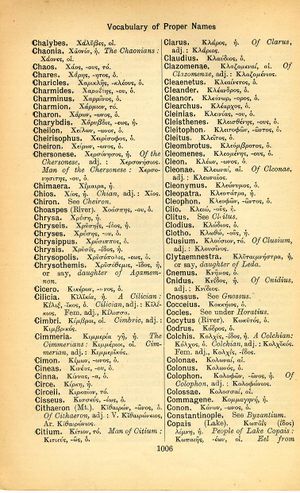Cocles
καλῶς γέ μου τὸν υἱὸν ὦ Στιλβωνίδη εὑρὼν ἀπιόντ' ἀπὸ γυμνασίου λελουμένον οὐκ ἔκυσας, οὐ προσεῖπας, οὐ προσηγάγου, οὐκ ὠρχιπέδισας, ὢν ἐμοὶ πατρικὸς φίλος → Ah! Is this well done, Stilbonides? You met my son coming from the bath after the gymnasium and you neither spoke to him, nor kissed him, nor took him with you, nor ever once felt his balls. Would anyone call you an old friend of mine?
English > Greek (Woodhouse)
See under Horatius.
Latin > English (Lewis & Short)
Cō̆cles: itis, m.,
I the cognomen of a Roman, Horatius Cocles. who, in the war with Porsenna, defended a bridge alone, Liv 2, 10, 2 sq.; Cic. Off. 1, 18, 61; id. Leg. 2, 4, 10; Verg. A. 8, 650; Plin. 34, 5, 11, § 22; 36, 15, 23, § 100 al.; Prop. 3 (4), 11, 63; Sen. Ep. 120, 7.
Latin > French (Gaffiot 2016)
(2) Cŏclĕs,¹³ ĭtis, m., Horatius Coclès [guerrier légendaire] : Liv. 2, 10, 2 || Coclĭtēs, um, m., la race des Coclès : Pl. Curc. 393.
Latin > German (Georges)
Cocles, clitis, m. (= ocles, Varr. l. l.), der (von Geburt) Einäugige, Enn. b. Varr. LL. 7, 71 (von den Arimaspen). Plaut. Curc. 393. Plin. 11, 150. – bes. der Römer Horatius Cocles, der die Tiberbrücke gegen das Heer des Porsenna allein verteidigte, Liv. 2, 10. Cic. de legg. 2, 10 u.a., bes. Dichter (s. Thiel Verg. Aen. 8, 650).

